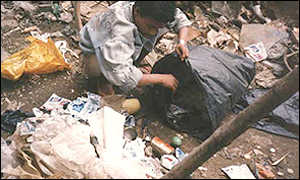|
|
|
| You are in: World: South Asia | |||||||||||||||||||||||||||||||||||||||||||||||
| Wednesday, 27 June,
2001, 14:53 GMT 15:53 UK
Bank accounts for Nepal's street
kids
 Street children used to have their money
stolen By Manisha Aryal in Kathmandu
About 600 children live and work in the streets of Kathmandu. They earn their living picking plastic, selling souvenirs and working as money-collectors in public buses and three-wheelers.
But Child Workers in Nepal (CWIN), a non-governmental organisation working to advance the rights of the children, has started a bank for them to keep their money safe. In a small room in Baafaal, western Kathmandu, a social worker who works with the street children counts handfuls of crumpled Nepali Rupee notes that the children hand him. Fourteen-year-old Rajan B K deposits his weeks' savings - 40 rupees (60 US cents) in his account. On the streets Three years ago, Rajan ran away from home in Chitwan, some 150km south of the capital, and came here in search of a job. He found no job. Instead, he ended up in the streets, begging. A few months later, he was severely beaten up by a group of older kids and lost what little money he had. Street life, he decided, was not for him and enrolled himself at CWIN's social centre in Baafal.
"The street is not a safe place for a kid, especially if he has a little bit of money," says Mr Pradhan. "Some kids sew their money into the inside seams of their trousers; some to their sleeves and some just sleep with their money in their mouth. "They were always afraid because once the older kids found out, they'd beat them and take their money away." Rajan was one of many street kids who found shelter in the CWIN centre. The centre also offers training for children, so they can learn a skill and use it to earn a living.
More than 300 street kids have opened savings accounts with CIWIN. "We used to visit these kids in the streets," says social worker Jhalak Gurung. "A couple of kids came up to us one day and asked us to keep their money for them. "Word got around and others started asking us to keep their money for them. "Soon, it became extremely hard for us to handle their money. So we thought, why not start a savings scheme and teach them banking?" Money sense CWIN's savings scheme works just like a regular bank. Customers get 60% interest on their savings; they can withdraw money; and can even apply for a loan when they are hard-pressed for cash. To make sure that the money comes from a legitimate source, the CWIN staff ask their customers detailed questions about where the money has come from before they accept a deposit. For Rajan, the bank is not just a place where he knows his money is safe. "It has taught me the value of managing my money," he says. "I've learned that if I save, I can do a lot more things with that same money. "Now I want to save enough so I can go back during the harvest festival in October and meet my parents. Although the bank has few customers now, CWIN believes it will be able to help many more children in the future. The money involved is small, but its a small fortune to children like Rajan and helps them plan for a safer future. |
See also:
Internet links:
The BBC is not responsible for the content of external internet sites Top South Asia stories now:
Links to more South Asia stories are at the foot
of the page. | ||||||||||||||||||||||||||||||||||||||||||||||
Links to more South Asia stories
|
|
| ||
| ^^ Back
to top News Front Page | World | UK | UK Politics | Business | Sci/Tech | Health | Education | Entertainment | Talking Point | In Depth | AudioVideo ---------------------------------------------------------------------------------- To BBC Sport>> | To BBC Weather>> ---------------------------------------------------------------------------------- News Sources | ||